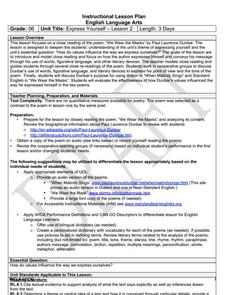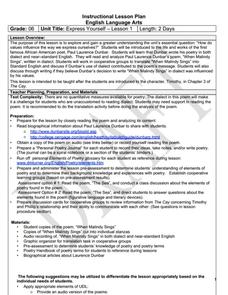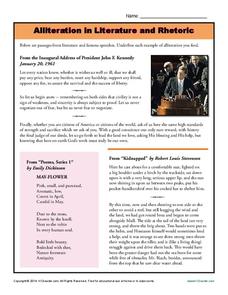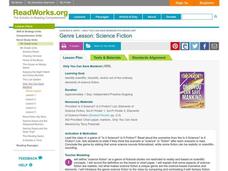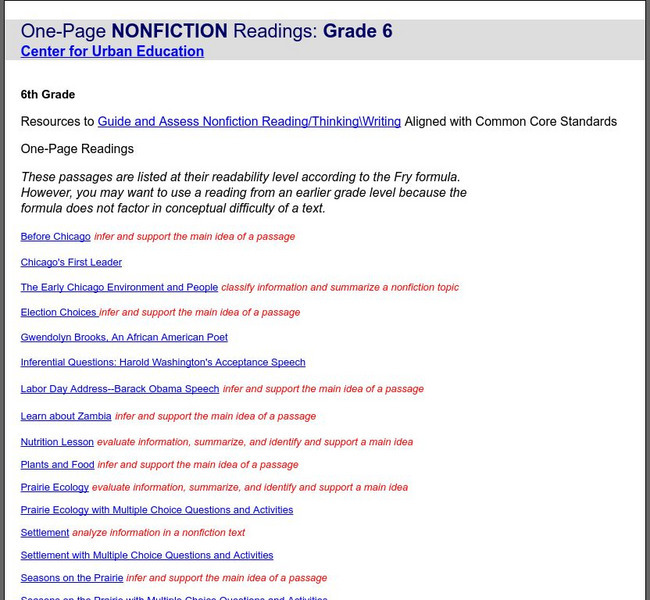Curated OER
Express Yourself Lesson Seed 12: Story Event
Focus on plot and the impact-specific events in The Cay. Class members use their double-entry journals, created in a previous lesson in this series, to record their thinking about the guiding question as they read chapters 15 through 17....
Curated OER
6th Grade: Express Yourself, Lesson 2: Close Read
The second lesson plan of a pair about Paul Laurence Dunbar, this plan focuses in particular on his poem, "We Wear the Masks." After a short historical introduction, class members conduct a series or readings, marking up the text and...
Curated OER
6th Grade: Express Yourself, Lesson 1: Poem
While originally created to accompany The Cay, this poetry lesson could be used on it's own, especially if you are working on dialect. Class members conduct a close reading of "When Malindy Sings" by Paul Laurence Dunbar and listen to an...
Learn NC
A Christmas Carol Chronology
Which comes first? The Ghost of Christmas Past, Present, or Future? What clues can readers use to establish the chronology of A Christmas Carol? The tale of Ebenezer Scrooge, Marley, and Tiny Tim provides the text for an activity that...
Curated OER
Thinking About Theme
Writers use the literary element of conflict to develop their theme. Use the conflict between the Johnny and the ScreeWees in Terry Pratchett’s Only You Can Save Mankind to model how a major theme is revealed. The conflict between the...
Curated OER
A Novel Study Unit for The Cay
Novelly written questions are perfect for a novel study guide unit on The Cay. The well-rounded resource contains an anticipation guide for scholars to complete before reading, a variety of questions per chapter of the book, and a post...
National Park Service
Petrified Forest National Park
Poetry Soup, a reading and writing unit constructed by the Petrified Forest National Park, will have scholars hungry to learn about nature. The cross-content unit contains topics related to history, science, and language arts. Content...
K12 Reader
Alliteration in Literature and Rhetoric
Middle schoolers are asked to identify the alliteration used in John F. Kennedy's Inaugural Address, Emily Dickinson's "May-Flower," and a passage from Robert Lewis Stevenson's Kidnapped.
Curated OER
Thinking about Theme
Sixth graders explore theme in science fiction texts by examining how plot conflicts are resolved. This resource focuses on Madeleine L'Engle's A Wrinkle in Time, but the approach and guiding questions could apply to a variety of texts.
Curated OER
The Similarities and Differences of Setting
Sixth graders identify components of the setting in science fiction text. In this compare and contrast settings lesson, 6th graders read Only You Can Save Mankind and identify similarities and differences between science fiction text and...
Curated OER
Genre Lesson: What is a Mystery?
Students identify the characteristics of the genre of mystery. In this genre instructional activity, students discover the elements of a mystery story and begin recording the elements on a class chart of the book entitled Two-Minute...
Curated OER
Science Fiction
Do your sixth graders like science fiction? Learn to identify elements of the science fiction genre with a literature lesson plan. They read from Only You Can Save Mankind and identify the objects, words, and characters from the...
Curated OER
Genre Lesson: Short Story
Stories from Sandra Cisneros' The House on Mango Street provide sixth graders with an opporltunity to identify the elements of a short story. After several modeling exercises, readers use the provided worksheet to recording information...
Curated OER
Identifying Symbols
Identify symbols within text and explain what they mean. Sixth graders examine Home of the Brave and identify recurring pictures in the text and discuss what they mean. They then choose a symbol from the text and explain what it means...
Curated OER
Just Lookin' For a Home
What is a boll weevil? Your class can find out that and more by following the activities included here. Pupils read an article, sing a boll weevil song, add to the song with their own original lyrics, illustrate the song, study the...
PBS
Pbs Learning Media: Walmart Middle School Litercy Initiative
Interactive, student-paced lessons on such literacy skills as categorizing, comparing and contrasting, summarizing, evaluating, determining cause and effect, using text features, connecting, inferring, sequencing, understanding problems...
Polk Brothers Foundation Center for Urban Education at DePaul University
De Paul University: Center for Urban Education: Nonfict Readers Analyze Structure/views[pdf]
This graphic organizer contains questions for students as they analyze any nonfiction text. Students will read closely to determine the text's structure, viewpoint, and tone. This graphic organizer is a copyrighted material that may be...
Polk Brothers Foundation Center for Urban Education at DePaul University
De Paul University: Center for Urban Education: Comprehensive Questions: Nonfiction [Pdf]
Questions are provided to help students determine the main idea, topic, and fact versus opinion of a nonfiction piece. Students are prompted to write a summary of an informational text.
Other
Curriculum Associates: Determining Theme or Central Idea [Pdf]
In this reading comprehension lesson unit, students are guided in learning how to find the main theme or idea of a text and understanding how details in the text convey that. Includes lots of exercises and examples, as well as...
ReadWriteThink
Read Write Think: Expository Escapade: Detective's Handbook
Working on higher-level thinking skills with your readers is made easier with this lesson. You will have your students connect with and analyze a mystery story at their grade-appropriate level. Lesson plan, printable worksheets, and...
Other
Academic Reading: Sample Task [Pdf]
This Academic Reading task provides a practice assessment for identifying headings and subheadings. In the task, students must read the selection and then determine the best subheading for each of the sections.
Polk Brothers Foundation Center for Urban Education at DePaul University
De Paul University: Center for Urban Education: One Page Nonfiction Readings: Grade 6
This site contains 17 nonfiction articles that are appropriate for students with a 6th grade reading level, as measured by the Fry Formula. Questions for each passage are provided. Graphic organizers are available for these copyrighted...
Other
Introducing Plain Language
This site by Plain Language Online states that plain language "begins with the needs of the reader," which will determine why and how the writer writes. It goes on to elaborate on audience and purpose, idea organization, use of...
University of Houston
University of Houston: Extra! Extra! What's the Big Idea?!
Get the feel of running a newspaper by selecting articles and pictures. If you are interested in checking out real newspapers, there is a clickable list of online newspapers for younger readers.



